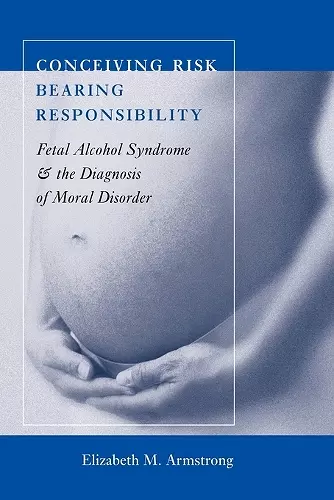Conceiving Risk, Bearing Responsibility:
Format:Paperback
Publisher:Johns Hopkins University Press
Published:13th Aug '08
Currently unavailable, and unfortunately no date known when it will be back

Armstrong insightfully mines historical, interview, medical and demographic data to create a virtual tour de force presentation. The book is sure to create controversy around current pregnancy, fetal, and alcohol policies and be a benchmark in alcohol and reproduction research for a long time. -- Peter Conrad, Brandeis University An extraordinarily lucid and well-balanced analysis. Using the tools of history, epidemiology, and sociology, Armstrong has made the social construction of fetal alcohol syndrome a site for illuminating research-and not a one-dimensional polemical slogan. This accessible book should be of interest to anyone interested in the formation and implementation of social policy-as well as historians of medicine and gender. -- Charles E. Rosenberg, Harvard University
Traces the evolution of medical knowledge about the effects of alcohol on fetal development from nineteenth-century debates about drinking and heredity to the modern diagnosis of FAS and its kindred syndromes.In American society, the consumption of alcohol during pregnancy is considered dangerous, irresponsible, and in some cases illegal. Pregnant women who have even a single drink routinely face openly voiced reproach. Yet fetal alcohol syndrome (FAS) in infants and children is notoriously difficult to diagnose, and the relationship between alcohol and adverse birth outcomes is riddled with puzzles and paradoxes. Sociologist Elizabeth M. Armstrong uses fetal alcohol syndrome and the problem of drinking during pregnancy to examine the assumed relationship between somatic and social disorder, the ways in which social problems are individualized, and the intertwining of health and morality that characterizes American society. She traces the evolution of medical knowledge about the effects of alcohol on fetal development, from nineteenth-century debates about drinking and heredity to the modern diagnosis of FAS and its kindred syndromes. She argues that issues of race, class, and gender have influenced medical findings about alcohol and reproduction and that these findings have always reflected broader social and moral preoccupations and, in particular, concerns about women's roles and place in society, as well as the fitness of future generations. Medical beliefs about drinking during pregnancy have often ignored the poverty, chaos, and insufficiency of some women's lives-factors that may be more responsible than alcohol for adverse outcomes in babies and children. Using primary sources and interviews to explore relationships between doctors and patients and women and their unborn children, Armstrong offers a provocative and detailed analysis of how drinking during pregnancy came to be considered a pervasive social problem, despite the uncertainties surrounding the epidemiology and etiology of fetal alcohol syndrome.
Easy and interesting to read from a historical as well as from a sociological perspective. Doody's Book Review Service In this well-written book, Elizabeth Armstrong provides an in-depth analysis of fetal alcohol syndrome as a social problem. -- Virginia Chang American Journal of Sociology 2005 A welcome and long overdue critique of the knowledge production in the United States surrounding alcohol use by pregnant women and the diagnostic category of fetal alcohol syndrome (FAS). Social History 2004 Excellent... FAS, because it is seen as preventable, allows society to blame pregnant women who transgress agreed-upon norms rather than seek solutions to the structural problems that lead to adverse birth outcomes and chronic alcohol consumption in the first place. -- Rebecca Tiger Theoretical Criminology 2006 An interesting and informative exploration of the construction of Fetal Alcohol Syndrome (FAS) as a major social problem within the US. It combines an historical overview, epidemiological data, and qualitative interviewing to show clearly how moral values affect medical and policy pronouncements. -- Pam Lowe Sociology of Health and Illness 2006 The book succeeds as a social history of the medicalization of FAS. -- Constance Weisner, DrPH, MSW JAMA 2005 Armstrong fully explores how our propensity to apply medical labels to social phenomena is worked out within a particular cultural context. -- Mairead Moloney Social Forces A well-researched, highly readable, and convincing example of the ways in which modern medicine continues to create myths, stigmatize the poor and pathologize gender. -- Hera Cook Social History of Medicine A rich and highly readable descriptive account of the gendered politics of moral entrepreneurship in American health research and policy regarding FAS. -- Erica Prussing Medical Anthropology Quarterly 2004 Armstrong draws attention to some important questions about our perceptions of responsibility for alcohol related harm sustained during pregnancy... I hope that her book will lead to a healthy debate and a more objective ethical, medical and scientific approach to this field in the future. -- C. C. H. Cook Addiction 2004 An important book that offers a welcome critique of FAS as a social construct. -- Claudia Malacrida Health 2005 There is much to admire in Armstrong's account: her clever deconstruction of the advocates' invented history of FAS, her sure-handed discussion of the politics of reproduction, and her often-fascinating interview material. -- David T. Courtwright Perspectives in Biology and Medicine 2004
ISBN: 9780801891083
Dimensions: unknown
Weight: unknown
296 pages